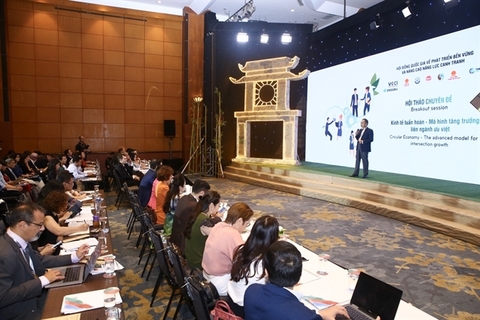
The conference on sustainable development 2019 was attended by about 1,000 leaders of the Government, representatives of international organisations, experts, researchers and businesses. — VNA/VNS Photo Thong Nhat
Viet Nam will take strong action to promote sustainable development, investing more in the workforce and advanced technologies, moving towards digital Government and digital society, Prime Minister Nguyen Xuan Phuc has said.
The PM was speaking at a conference on sustainable development in Ha Noi that he chaired alongside his deputy Vu Duc Dam on Thursday.
The conference, held by the National Council for Sustainable Development and Competitiveness Improvement, the Vietnam Chamber of Commerce and Industry (VCCI), and the World Bank, was themed 'For a Decade of More Sustainable Development', gathering about 1,000 leaders of the Government, representatives of international organisations, experts, researchers and businesses.
Phuc asked ministries, sectors and localities nationwide to encourage businesses and people to be creative and innovative to help Viet Nam boost its competitiveness in global markets.
“We need to build policies to inspire businesses applying the circular economy model effectively, encouraging green production activities, helping the country reach the targets of the sustainable development plan in 2020-30,” Phuc said.
He also emphasised that the globalisation of technology will change thinking, but that Viet Nam must preserve its cultural values, making changes but still promoting sustainable development.
“I require ministries and sectors, especially ministers, to join with the Government to study and issue a decree on sustainable development soon, which must be renewable and practical, having concrete objectives and policies, and ensuring efficiency in the future,” the Prime Minister added.
At the event, Deputy PM Dam said the conference aimed to set cross-cutting objectives based on the development of the circular economy with scientific and technological innovations and the building of human resources towards sustainable development goals.
“It will be difficult to achieve the goals without the efforts and determination of the Government, all levels, sectors, the business community and all of society,” Dam said.
Deputy Minister of Planning and Investment Nguyen Van Trung said the Prime Minister issued a National Action Plan in 2017, responding to the UN's 2030 Agenda for Sustainable Development, including 17 common goals and 169 specific goals.
“One of the important tasks set out in the Action Plan is that all Viet Nam’s sustainable development goals will be integrated into the content of the Socio-Economic Development Strategy for 2021-30,” Dung said.
He said in recent years, the perspective of sustainable development has been integrated throughout the Socio-Economic Development Strategy 2011-20, which has been concretised in many strategies, plans and policies.
Statistics show Viet Nam’s poverty rate decreased from 9.9 per cent in 2015 to less than 7 per cent in 2017, while health insurance coverage reached 86.4 per cent in 2017. More than 99 per cent of Vietnamese households had access to electricity in 2016. The country’s GDP growth in 2015, 2016 and 2017 reached 6.7 per cent, 6.2 per cent and 6.8 per cent, respectively.
“The Ministry of Planning and Investment is currently conducting research, analysis, evaluation and selection of appropriate sustainable development goals to integrate into the Socio-Economic Development Strategy 2021-30,” Dung added.
At the conference, experts, domestic and foreign enterprises discussed research and experience in sustainable development, including production methods of the circular economy and technological breakthroughs. These are not only actions to protect the environment and to achieve sustainable development, but also to enhance the competitiveness of enterprises.
Daniel Dulitzky, WB Director for Human Resource Development in the East Asia-Pacific Region, said although Viet Nam is showing good performance in human capital index, it is still facing challenges in ensuring high-quality human resources, which are needed to narrow the gap among ethnic minority groups and strengthen the development of the workforce.
Dulitzky also recommended reforming national target programmes, renovating the university education system and drawing private investment in education-training.
Matt Wilson, Corporate Affairs Director of Heineken Vietnam, said sustainability is a core part of the company’s long-term vision.
He said almost all of Heineken Vietnam’s bottles are returned for reuse before eventually being recycled, while materials like cardboard, aluminum, plastic and paper are reused or recycled. The firm’s initiatives including powering four of its six breweries with renewable thermal energy from carbon neutral, biomass-generated steam and reducing 2,500 tonnes of CO2 emissions from its logistic operations alone in 2018.
“We hope this will encourage more businesses in Viet Nam to think of their own sustainable development journey and how they can apply circular economy strategies to reduce waste and preserve scarce natural resources,” Wilson said.
At the conference, Chairman of the Vietnam Chamber of Commerce and Industry Vu Tien Loc announced five initiatives of sustainable development that will be expanded in the future, including not-for-profit Packaging Recycling Organization Vietnam (PRO Vietnam) to support the growth of a strong, resilient domestic packaging collection and recycling ecosystem.
To promote the circular economy, Loc proposed the National Assembly promulgate the Law on Promoting Circular Economy. Along with that, the National Assembly and the Government should soon have policies to encourage the development of circular economy models in the community and businesses, in which enterprises play a central role. — VNS